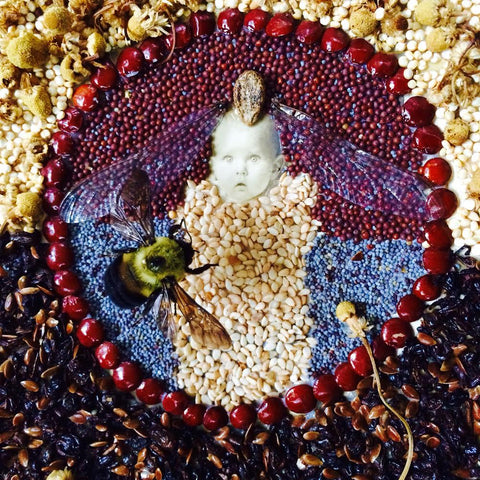Your Cart is Empty
Seedles policy is not to buy any seeds treated with neonicotinoids.
Guest post by Nora Wildgen of BeeSwell
Seeds are wondrous things. As metaphors they sprout hope in our hearts. They blossom as awareness in our consciousness. In the physical world they are miraculously engineered packages of DNA. They float. They fly. They transport life's diversity through time and space. They survive fire, drought, floods, and volcanic winter.
The seed of a date palm more than two thousand years old was dug from King Herod's palace and planted. It grew. They named it Methuselah.
Seeds are the love-child of pollinators and flowering plants. Entomophily; pollination by insects. Entomo; insect. Phile; love.
 Picture the orchid; it's beautiful intricacies co-evolved with pollinators, matching form and function in a reproductive cross-species tango. A rapture of perfume and pollen, a petal stroked, nectar stoked love-fest that produces fruit and seed, butterflies and bees.
Picture the orchid; it's beautiful intricacies co-evolved with pollinators, matching form and function in a reproductive cross-species tango. A rapture of perfume and pollen, a petal stroked, nectar stoked love-fest that produces fruit and seed, butterflies and bees.
My mother in-law is on her way over with seeds for me. She is bringing cup plant and partridge pea seeds. Cup plants are stately North American perennials with a gleeful profusion of sunflower-like blooms adored by bees and butterflies. Their clasped leaves hold rainfall, hence their name. The great stalks are home to native bees, their seeds are feasted upon by finches. The partridge pea is a nectar rich native annual with bright yellow pea-like flowers, and feathery foliage.
In exchange, I have wild indigo seeds for her. These large pods rattle enticingly, and are often used in dried arrangements. Bumblebees find indigo irresistible. On one bumblebee survey I found bumbles of three different species, all in joyous oblivion deep inside indigo blossoms, ignoring every other flowering plant in the meadow.
Seed exchanges like this have gone on for as long as humanity has cultured plants. Saving seeds, or seed banking, is the practice of storing seeds, roots and tubers from year to year. For millennia, seed banking has been the traditional way of maintaining our farms and gardens.
That's the fun part of seeds. Here comes the worrisome part; in the past five decades we have shifted from seed banking to seed buying. Most people don't know that the majority of these plants and seeds they buy are now treated with pesticides; invisible, unlabeled, and toxic to our pollinators.
Meet the scary family of systemic pesticides called Neonicotinoids.
Neonicotinoids, or neonics, are a class of neural toxins based on nicotine. Their names float through my mind late at night, like a poison mantra. They are Acetamidprid, Clothianiadin, Dinotefuran, Imidacloprid, Thiamethoxam...Fipronil.
Neonicotinoids are now the world's most widely used pesticide. A recent meta analysis of over 800 scientific studies shows neonicotinoid pesticides to be 5000 to 10,000 times more toxic than DDT. Between 75 and 95% of the world's flowering plants need pollinators to produce seed or fruit. It's not just one third of our food, this critical situation affects virtually everything alive, the seeds of life.
"Every problem has in it the seeds of its own solution." - Norman Vincent Peale
What to do? Here are easy steps you can take to make a pollinator friendly environment in your own backyard, city, state, and beyond:
Be brave! It's urgent. It's late. But it's not too late. Plant hope. Grow the Rainbow!
Bee Swell!
Nora
Pesticides linked to mass bee deaths also affect other friendly organisms including birds and fish
Bee toxic pesticides found in garden center plants labeled bee friendly
You need pollinators, pollinators need you
****
Grow The Rainbow has begun a series of guest blogs. Our featured writer in " Seeds of Inspiration" is Nora Wildgen, an illustrator with a bee in her bonnet. Visit BeeSwell.org to find her free and downloadable art posters to save the bees.
Comments will be approved before showing up.